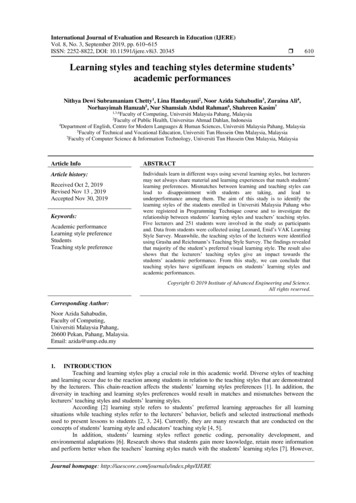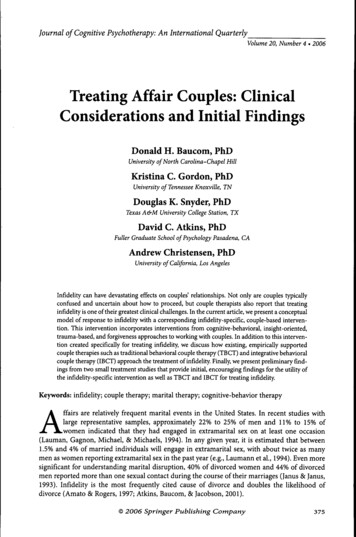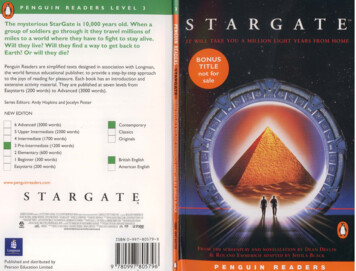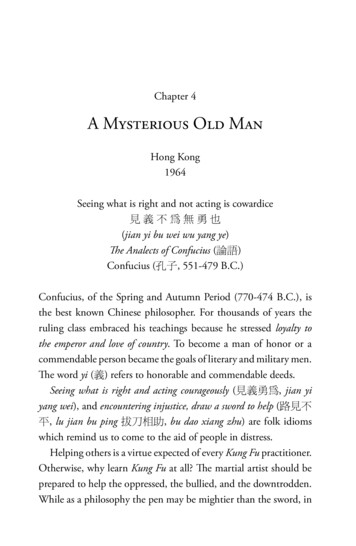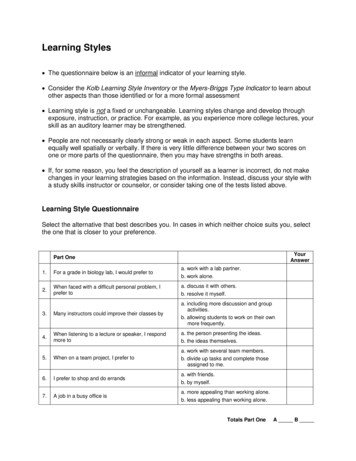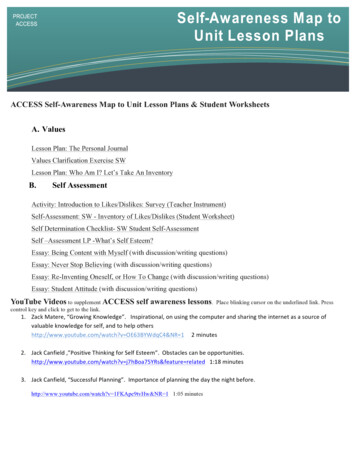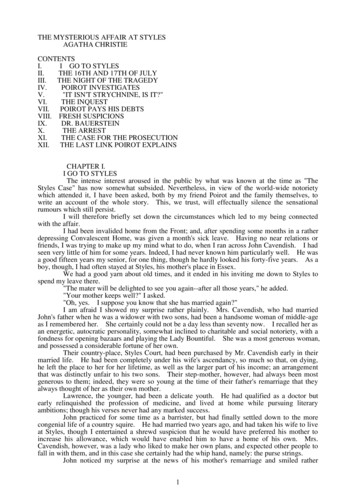
Transcription
THE MYSTERIOUS AFFAIR AT STYLESAGATHA CHRISTIECONTENTSI.I GO TO STYLESII.THE 16TH AND 17TH OF JULYIII.THE NIGHT OF THE TRAGEDYIV.POIROT INVESTIGATESV."IT ISN'T STRYCHNINE, IS IT?"VI.THE INQUESTVII. POIROT PAYS HIS DEBTSVIII. FRESH SUSPICIONSIX.DR. BAUERSTEINX.THE ARRESTXI.THE CASE FOR THE PROSECUTIONXII. THE LAST LINK POIROT EXPLAINSCHAPTER I.I GO TO STYLESThe intense interest aroused in the public by what was known at the time as "TheStyles Case" has now somewhat subsided. Nevertheless, in view of the world-wide notorietywhich attended it, I have been asked, both by my friend Poirot and the family themselves, towrite an account of the whole story. This, we trust, will effectually silence the sensationalrumours which still persist.I will therefore briefly set down the circumstances which led to my being connectedwith the affair.I had been invalided home from the Front; and, after spending some months in a ratherdepressing Convalescent Home, was given a month's sick leave. Having no near relations orfriends, I was trying to make up my mind what to do, when I ran across John Cavendish. I hadseen very little of him for some years. Indeed, I had never known him particularly well. He wasa good fifteen years my senior, for one thing, though he hardly looked his forty-five years. As aboy, though, I had often stayed at Styles, his mother's place in Essex.We had a good yarn about old times, and it ended in his inviting me down to Styles tospend my leave there."The mater will be delighted to see you again--after all those years," he added."Your mother keeps well?" I asked."Oh, yes. I suppose you know that she has married again?"I am afraid I showed my surprise rather plainly. Mrs. Cavendish, who had marriedJohn's father when he was a widower with two sons, had been a handsome woman of middle-ageas I remembered her. She certainly could not be a day less than seventy now. I recalled her asan energetic, autocratic personality, somewhat inclined to charitable and social notoriety, with afondness for opening bazaars and playing the Lady Bountiful. She was a most generous woman,and possessed a considerable fortune of her own.Their country-place, Styles Court, had been purchased by Mr. Cavendish early in theirmarried life. He had been completely under his wife's ascendancy, so much so that, on dying,he left the place to her for her lifetime, as well as the larger part of his income; an arrangementthat was distinctly unfair to his two sons. Their step-mother, however, had always been mostgenerous to them; indeed, they were so young at the time of their father's remarriage that theyalways thought of her as their own mother.Lawrence, the younger, had been a delicate youth. He had qualified as a doctor butearly relinquished the profession of medicine, and lived at home while pursuing literaryambitions; though his verses never had any marked success.John practiced for some time as a barrister, but had finally settled down to the morecongenial life of a country squire. He had married two years ago, and had taken his wife to liveat Styles, though I entertained a shrewd suspicion that he would have preferred his mother toincrease his allowance, which would have enabled him to have a home of his own. Mrs.Cavendish, however, was a lady who liked to make her own plans, and expected other people tofall in with them, and in this case she certainly had the whip hand, namely: the purse strings.John noticed my surprise at the news of his mother's remarriage and smiled rather1
ruefully."Rotten little bounder too!" he said savagely. "I can tell you, Hastings, it's making lifejolly difficult for us. As for Evie--you remember Evie?""No.""Oh, I suppose she was after your time. She's the mater's factotum, companion, Jack ofall trades! A great sport--old Evie! Not precisely young and beautiful, but as game as they makethem.""You were going to say----?""Oh, this fellow! He turned up from nowhere, on the pretext of being a second cousin orsomething of Evie's, though she didn't seem particularly keen to acknowledge the relationship.The fellow is an absolute outsider, anyone can see that. He's got a great black beard, and wearspatent leather boots in all weathers! But the mater cottoned to him at once, took him on assecretary--you know how she's always running a hundred societies?"I nodded."Well, of course the war has turned the hundreds into thousands. No doubt the fellowwas very useful to her. But you could have knocked us all down with a feather when, threemonths ago, she suddenly announced that she and Alfred were engaged! The fellow must be atleast twenty years younger than she is! It's simply bare-faced fortune hunting; but there youare--she is her own mistress, and she's married him.""It must be a difficult situation for you all.""Difficult! It's damnable!"Thus it came about that, three days later, I descended from the train at Styles St. Mary,an absurd little station, with no apparent reason for existence, perched up in the midst of greenfields and country lanes. John Cavendish was waiting on the platform, and piloted me out to thecar."Got a drop or two of petrol still, you see," he remarked. "Mainly owing to the mater'sactivities."The village of Styles St. Mary was situated about two miles from the little station, andStyles Court lay a mile the other side of it. It was a still, warm day in early July. As onelooked out over the flat Essex country, lying so green and peaceful under the afternoon sun, itseemed almost impossible to believe that, not so very far away, a great war was running itsappointed course. I felt I had suddenly strayed into another world. As we turned in at thelodge gates, John said:"I'm afraid you'll find it very quiet down here, Hastings.""My dear fellow, that's just what I want.""Oh, it's pleasant enough if you want to lead the idle life. I drill with the volunteerstwice a week, and lend a hand at the farms. My wife works regularly 'on the land'. She is upat five every morning to milk, and keeps at it steadily until lunchtime. It's a jolly good life takingit all round--if it weren't for that fellow Alfred Inglethorp!" He checked the car suddenly, andglanced at his watch. "I wonder if we've time to pick up Cynthia. No, she'll have started fromthe hospital by now.""Cynthia! That's not your wife?""No, Cynthia is a protegee of my mother's, the daughter of an old schoolfellow of hers,who married a rascally solicitor. He came a cropper, and the girl was left an orphan andpenniless. My mother came to the rescue, and Cynthia has been with us nearly two years now.She works in the Red Cross Hospital at Tadminster, seven miles away."As he spoke the last words, we drew up in front of the fine old house. A lady in a stouttweed skirt, who was bending over a flower bed, straightened herself at our approach."Hullo, Evie, here's our wounded hero! Mr. Hastings--Miss Howard."Miss Howard shook hands with a hearty, almost painful, grip. I had an impression ofvery blue eyes in a sunburnt face. She was a pleasant-looking woman of about forty, with adeep voice, almost manly in its stentorian tones, and had a large sensible square body, with feetto match--these last encased in good thick boots. Her conversation, I soon found, was couchedin the telegraphic style."Weeds grow like house afire. Can't keep even with 'em. Shall press you in. Betterbe careful.""I'm sure I shall be only too delighted to make myself useful," I responded."Don't say it. Never does. Wish you hadn't later.""You're a cynic, Evie," said John, laughing. "Where's tea to-day--inside or out?""Out. Too fine a day to be cooped up in the house."2
"Come on then, you've done enough gardening for to-day. 'The labourer is worthy ofhis hire', you know. Come and be refreshed.""Well," said Miss Howard, drawing off her gardening gloves, "I'm inclined to agree withyou."She led the way round the house to where tea was spread under the shade of a largesycamore.A figure rose from one of the basket chairs, and came a few steps to meet us."My wife, Hastings," said John.I shall never forget my first sight of Mary Cavendish. Her tall, slender form, outlinedagainst the bright light; the vivid sense of slumbering fire that seemed to find expression only inthose wonderful tawny eyes of hers, remarkable eyes, different from any other woman's that Ihave ever known; the intense power of stillness she possessed, which nevertheless conveyed theimpression of a wild untamed spirit in an exquisitely civilised body--all these things are burntinto my memory. I shall never forget them.She greeted me with a few words of pleasant welcome in a low clear voice, and I sankinto a basket chair feeling distinctly glad that I had accepted John's invitation. Mrs. Cavendishgave me some tea, and her few quiet remarks heightened my first impression of her as athoroughly fascinating woman. An appreciative listener is always stimulating, and I described,in a humorous manner, certain incidents of my Convalescent Home, in a way which, I flattermyself, greatly amused my hostess. John, of course, good fellow though he is, could hardly becalled a brilliant conversationalist.At that moment a well remembered voice floated through the open French window nearat hand:"Then you'll write to the Princess after tea, Alfred? I'll write to Lady Tadminster for thesecond day, myself. Or shall we wait until we hear from the Princess? In case of a refusal, LadyTadminster might open it the first day, and Mrs. Crosbie the second. Then there's theDuchess--about the school fete."There was the murmur of a man's voice, and then Mrs. Inglethorp's rose in reply:"Yes, certainly. After tea will do quite well. You are so thoughtful, Alfred dear."The French window swung open a little wider, and a handsome white-haired old lady,with a somewhat masterful cast of features, stepped out of it on to the lawn. A man followedher, a suggestion of deference in his manner.Mrs. Inglethorp greeted me with effusion."Why, if it isn't too delightful to see you again, Mr. Hastings, after all these years.Alfred, darling, Mr. Hastings--my husband."I looked with some curiosity at "Alfred darling". He certainly struck a rather alien note.I did not wonder at John objecting to his beard. It was one of the longest and blackest I haveever seen. He wore gold-rimmed pince-nez, and had a curious impassivity of feature. It struckme that he might look natural on a stage, but was strangely out of place in real life. His voicewas rather deep and unctuous. He placed a wooden hand in mine and said:"This is a pleasure, Mr. Hastings." Then, turning to his wife: "Emily dearest, I think thatcushion is a little damp."She beamed fondly on him, as he substituted another with every demonstration of thetenderest care. Strange infatuation of an otherwise sensible woman!With the presence of Mr. Inglethorp, a sense of constraint and veiled hostility seemed tosettle down upon the company. Miss Howard, in particular, took no pains to conceal herfeelings. Mrs. Inglethorp, however, seemed to notice nothing unusual. Her volubility, which Iremembered of old, had lost nothing in the intervening years, and she poured out a steady floodof conversation, mainly on the subject of the forthcoming bazaar which she was organizing andwhich was to take place shortly. Occasionally she referred to her husband over a question of daysor dates. His watchful and attentive manner never varied. From the very first I took a firmand rooted dislike to him, and I flatter myself that my first judgments are usually fairly shrewd.Presently Mrs. Inglethorp turned to give some instructions about letters to EvelynHoward, and her husband addressed me in his painstaking voice:"Is soldiering your regular profession, Mr. Hastings?""No, before the war I was in Lloyd's.""And you will return there after it is over?""Perhaps. Either that or a fresh start altogether."Mary Cavendish leant forward."What would you really choose as a profession, if you could just consult your3
inclination?""Well, that depends.""No secret hobby?" she asked. "Tell me--you're drawn to something? Every oneis--usually something absurd.""You'll laugh at me."She smiled."Perhaps.""Well, I've always had a secret hankering to be a detective!""The real thing--Scotland Yard? Or Sherlock Holmes?""Oh, Sherlock Holmes by all means. But really, seriously, I am awfully drawn to it. Icame across a man in Belgium once, a very famous detective, and he quite inflamed me. Hewas a marvellous little fellow. He used to say that all good detective work was a mere matter ofmethod. My system is based on his--though of course I have progressed rather further. Hewas a funny little man, a great dandy, but wonderfully clever.""Like a good detective story myself," remarked Miss Howard. "Lots of nonsense written,though. Criminal discovered in last chapter. Every one dumbfounded. Real crime--you'dknow at once.""There have been a great number of undiscovered crimes," I argued."Don't mean the police, but the people that are right in it. The family. You couldn'treally hoodwink them. They'd know.""Then," I said, much amused, "you think that if you were mixed up in a crime, say amurder, you'd be able to spot the murderer right off?""Of course I should. Mightn't be able to prove it to a pack of lawyers. But I'm certainI'd know. I'd feel it in my fingertips if he came near me.""It might be a 'she,' " I suggested."Might. But murder's a violent crime. Associate it more with a man.""Not in a case of poisoning." Mrs. Cavendish's clear voice startled me. "Dr. Bauersteinwas saying yesterday that, owing to the general ignorance of the more uncommon poisons amongthe medical profession, there were probably countless cases of poisoning quite unsuspected.""Why, Mary, what a gruesome conversation!" cried Mrs. Inglethorp. "It makes me feelas if a goose were walking over my grave. Oh, there's Cynthia!"A young girl in V. A. D. uniform ran lightly across the lawn."Why, Cynthia, you are late to-day. This is Mr. Hastings--Miss Murdoch."Cynthia Murdoch was a fresh-looking young creature, full of life and vigour. Shetossed off her little V. A. D. cap, and I admired the great loose waves of her auburn hair,and the smallness and whiteness of the hand she held out to claim her tea. With dark eyes andeyelashes she would have been a beauty.She flung herself down on the ground beside John, and as I handed her a plate ofsandwiches she smiled up at me."Sit down here on the grass, do. It's ever so much nicer."I dropped down obediently."You work at Tadminster, don't you, Miss Murdoch?"She nodded."For my sins.""Do they bully you, then?" I asked, smiling."I should like to see them!" cried Cynthia with dignity."I have got a cousin who is nursing," I remarked. "And she is terrified of 'Sisters'.""I don't wonder. Sisters are , you know, Mr. Hastings. They simp--ly are !You've no idea! But I'm not a nurse, thank heaven, I work in the dispensary.""How many people do you poison?" I asked, smiling.Cynthia smiled too."Oh, hundreds!" she said."Cynthia," called Mrs. Inglethorp, "do you think you could write a few notes for me?""Certainly, Aunt Emily."She jumped up promptly, and something in her manner reminded me that her positionwas a dependent one, and that Mrs. Inglethorp, kind as she might be in the main, did not allowher to forget it.My hostess turned to me."John will show you your room. Supper is at half-past seven. We have given up latedinner for some time now. Lady Tadminster, our Member's wife--she was the late Lord4
Abbotsbury's daughter--does the same. She agrees with me that one must set an example ofeconomy. We are quite a war household; nothing is wasted here--every scrap of waste paper,even, is saved and sent away in sacks."I expressed my appreciation, and John took me into the house and up the broad staircase,which forked right and left half-way to different wings of the building. My room was in the leftwing, and looked out over the park.John left me, and a few minutes later I saw him from my window walking slowly acrossthe grass arm in arm with Cynthia Murdoch. I heard Mrs. Inglethorp call "Cynthia" impatiently,and the girl started and ran back to the house. At the same moment, a man stepped out from theshadow of a tree and walked slowly in the same direction. He looked about forty, very darkwith a melancholy clean-shaven face. Some violent emotion seemed to be mastering him. Helooked up at my window as he passed, and I recognized him, though he had changed much in thefifteen years that had elapsed since we last met. It was John's younger brother, LawrenceCavendish. I wondered what it was that had brought that singular expression to his face.Then I dismissed him from my mind, and returned to the contemplation of my ownaffairs.The evening passed pleasantly enough; and I dreamed that night of that enigmaticalwoman, Mary Cavendish.The next morning dawned bright and sunny, and I was full of the anticipation of adelightful visit.I did not see Mrs. Cavendish until lunch-time, when she volunteered to take me for awalk, and we spent a charming afternoon roaming in the woods, returning to the house aboutfive.As we entered the large hall, John beckoned us both into the smoking-room. I saw atonce by his face that something disturbing had occurred. We followed him in, and he shut thedoor after us."Look here, Mary, there's the deuce of a mess. Evie's had a row with Alfred Inglethorp,and she's off.""Evie? Off?"John nodded gloomily."Yes; you see she went to the mater, and--Oh, here's Evie herself."Miss Howard entered. Her lips were set grimly together, and she carried a smallsuit-case. She looked excited and determined, and slightly on the defensive."At any rate," she burst out, "I've spoken my mind!""My dear Evelyn," cried Mrs. Cavendish, "this can't be true!"Miss Howard nodded grimly."True enough! Afraid I said some things to Emily she won't forget or forgive in a hurry.Don't mind if they've only sunk in a bit. Probably water off a duck's back, though. I said rightout: 'You're an old woman, Emily, and there's no fool like an old fool. The man's twenty yearsyounger than you, and don't you fool yourself as to what he married you for. Money! Well,don't let him have too much of it. Farmer Raikes has got a very pretty young wife. Just askyour Alfred how much time he spends over there.' She was very angry. Natural! I went on, 'I'mgoing to warn you, whether you like it or not. That man would as soon murder you in your bedas look at you. He's a bad lot. You can say what you like to me, but remember what I've toldyou. He's a bad lot!' ""What did she say?"Miss Howard made an extremely expressive grimace." 'Darling Alfred'--'dearest Alfred'--'wicked calumnies' --'wicked lies'--'wickedwoman'--to accuse her 'dear husband'! The sooner I left her house the better. So I'm off.""But not now?""This minute!"For a moment we sat and stared at her. Finally John Cavendish, finding hispersuasions of no avail, went off to look up the trains. His wife followed him, murmuringsomething about persuading Mrs. Inglethorp to think better of it.As she left the room, Miss Howard's face changed. She leant towards me eagerly."Mr. Hastings, you're honest. I can trust you?"I was a little startled. She laid her hand on my arm, and sank her voice to a whisper."Look after her, Mr. Hastings. My poor Emily. They're a lot of sharks--all of them.Oh, I know what I'm talking about. There isn't one of them that's not hard up and trying to getmoney out of her. I've protected her as much as I could. Now I'm out of the way, they'll5
impose upon her.""Of course, Miss Howard," I said, "I'll do everything I can, but I'm sure you're excitedand overwrought."She interrupted me by slowly shaking her forefinger."Young man, trust me. I've lived in the world rather longer than you have. All I askyou is to keep your eyes open. You'll see what I mean."The throb of the motor came through the open window, and Miss Howard rose andmoved to the door. John's voice sounded outside. With her hand on the handle, she turned herhead over her shoulder, and beckoned to me."Above all, Mr. Hastings, watch that devil--her husband!"There was no time for more. Miss Howard was swallowed up in an eager chorus ofprotests and good-byes. The Inglethorps did not appear.As the motor drove away, Mrs. Cavendish suddenly detached herself from the group,and moved across the drive to the lawn to meet a tall bearded man who had been evidentlymaking for the house. The colour rose in her cheeks as she held out her hand to him."Who is that?" I asked sharply, for instinctively I distrusted the man."That's Dr. Bauerstein," said John shortly."And who is Dr. Bauerstein?""He's staying in the village doing a rest cure, after a bad nervous breakdown. He's aLondon specialist; a very clever man--one of the greatest living experts on poisons, I believe.""And he's a great friend of Mary's," put in Cynthia, the irrepressible.John Cavendish frowned and changed the subject."Come for a stroll, Hastings. This has been a most rotten business. She always had arough tongue, but there is no stauncher friend in England than Evelyn Howard."He took the path through the plantation, and we walked down to the village through thewoods which bordered one side of the estate.As we passed through one of the gates on our way home again, a pretty young woman ofgipsy type coming in the opposite direction bowed and smiled."That's a pretty girl," I remarked appreciatively.John's face hardened."That is Mrs. Raikes.""The one that Miss Howard----""Exactly," said John, with rather unnecessary abruptness.I thought of the white-haired old lady in the big house, and that vivid wicked little facethat had just smiled into ours, and a vague chill of foreboding crept over me. I brushed it aside."Styles is really a glorious old place," I said to John.He nodded rather gloomily."Yes, it's a fine property. It'll be mine some day--should be mine now by rights, if myfather had only made a decent will. And then I shouldn't be so damned hard up as I am now.""Hard up, are you?""My dear Hastings, I don't mind telling you that I'm at my wit's end for money.""Couldn't your brother help you?""Lawrence? He's gone through every penny he ever had, publishing rotten verses infancy bindings. No, we're an impecunious lot. My mother's always been awfully good to us, Imust say. That is, up to now. Since her marriage, of course----" he broke off, frowning.For the first time I felt that, with Evelyn Howard, something indefinable had gone fromthe atmosphere. Her presence had spelt security. Now that security was removed--and the airseemed rife with suspicion. The sinister face of Dr. Bauerstein recurred to me unpleasantly. Avague suspicion of every one and everything filled my mind. Just for a moment I had apremonition of approaching evil.CHAPTER II.THE 16TH AND 17TH OF JULYI had arrived at Styles on the 5th of July. I come now to the events of the 16th and17th of that month. For the convenience of the reader I will recapitulate the incidents of thosedays in as exact a manner as possible. They were elicited subsequently at the trial by a processof long and tedious cross-examinations.I received a letter from Evelyn Howard a couple of days after her departure, telling meshe was working as a nurse at the big hospital in Middlingham, a manufacturing town somefifteen miles away, and begging me to let her know if Mrs. Inglethorp should show any wish to6
be reconciled.The only fly in the ointment of my peaceful days was Mrs. Cavendish's extraordinary,and, for my part, unaccountable preference for the society of Dr. Bauerstein. What she saw inthe man I cannot imagine, but she was always asking him up to the house, and often went off forlong expeditions with him. I must confess that I was quite unable to see his attraction.The 16th of July fell on a Monday. It was a day of turmoil. The famous bazaar hadtaken place on Saturday, and an entertainment, in connection with the same charity, at which Mrs.Inglethorp was to recite a War poem, was to be held that night. We were all busy during themorning arranging and decorating the Hall in the village where it was to take place. We had alate luncheon and spent the afternoon resting in the garden. I noticed that John's manner wassomewhat unusual. He seemed very excited and restless.After tea, Mrs. Inglethorp went to lie down to rest before her efforts in the evening and Ichallenged Mary Cavendish to a single at tennis.About a quarter to seven, Mrs. Inglethorp called us that we should be late as supper wasearly that night. We had rather a scramble to get ready in time; and before the meal was overthe motor was waiting at the door.The entertainment was a great success, Mrs. Inglethorp's recitation receivingtremendous applause. There were also some tableaux in which Cynthia took part. She did notreturn with us, having been asked to a supper party, and to remain the night with some friendswho had been acting with her in the tableaux.The following morning, Mrs. Inglethorp stayed in bed to breakfast, as she was ratherovertired; but she appeared in her briskest mood about 12.30, and swept Lawrence and myself offto a luncheon party."Such a charming invitation from Mrs. Rolleston. Lady Tadminster's sister, you know.The Rollestons came over with the Conqueror--one of our oldest families."Mary had excused herself on the plea of an engagement with Dr. Bauerstein.We had a pleasant luncheon, and as we drove away Lawrence suggested that we shouldreturn by Tadminster, which was barely a mile out of our way, and pay a visit to Cynthia in herdispensary. Mrs. Inglethorp replied that this was an excellent idea, but as she had several lettersto write she would drop us there, and we could come back with Cynthia in the pony-trap.We were detained under suspicion by the hospital porter, until Cynthia appeared tovouch for us, looking very cool and sweet in her long white overall. She took us up to hersanctum, and introduced us to her fellow dispenser, a rather awe-inspiring individual, whomCynthia cheerily addressed as "Nibs.""What a lot of bottles!" I exclaimed, as my eye travelled round the small room. "Doyou really know what's in them all?""Say something original," groaned Cynthia. "Every single person who comes up heresays that. We are really thinking of bestowing a prize on the first individual who does notsay: 'What a lot of bottles!' And I know the next thing you're going to say is: 'How many peoplehave you poisoned?' "I pleaded guilty with a laugh."If you people only knew how fatally easy it is to poison some one by mistake, youwouldn't joke about it. Come on, let's have tea. We've got all sorts of secret stories in thatcupboard. No, Lawrence--that's the poison cupboard. The big cupboard--that's right."We had a very cheery tea, and assisted Cynthia to wash up afterwards. We had just putaway the last tea-spoon when a knock came at the door. The countenances of Cynthia and Nibswere suddenly petrified into a stern and forbidding expression."Come in," said Cynthia, in a sharp professional tone.A young and rather scared looking nurse appeared with a bottle which she proffered toNibs, who waved her towards Cynthia with the somewhat enigmatical remark:" I 'm not really here to-day."Cynthia took the bottle and examined it with the severity of a judge."This should have been sent up this morning.""Sister is very sorry. She forgot.""Sister should read the rules outside the door."I gathered from the little nurse's expression that there was not the least likelihood of herhaving the hardihood to retail this message to the dreaded "Sister"."So now it can't be done until to-morrow," finished Cynthia."Don't you think you could possibly let us have it to-night?""Well," said Cynthia graciously, "we are very busy, but if we have time it shall be7
done."The little nurse withdrew, and Cynthia promptly took a jar from the shelf, refilled thebottle, and placed it on the table outside the door.I laughed."Discipline must be maintained?""Exactly. Come out on our little balcony. You can see all the outside wards there."I followed Cynthia and her friend and they pointed out the different wards to me.Lawrence remained behind, but after a few moments Cynthia called to him over her shoulder tocome and join us. Then she looked at her watch."Nothing more to do, Nibs?""No.""All right. Then we can lock up and go."I had seen Lawrence in quite a different light that afternoon. Compared to John, he wasan astoundingly difficult person to get to know. He was the opposite of his brother in almostevery respect, being unusually shy and reserved. Yet he had a certain charm of manner, and Ifancied that, if one really knew him well, one could have a deep affection for him. I had alwaysfancied that his manner to Cynthia was rather constrained, and that she on her side was inclinedto be shy of him. But they were both gay enough this afternoon, and chatted together like acouple of children.As we drove through the village, I remembered that I wanted some stamps, soaccordingly we pulled up at the post office.As I came out again, I cannoned into a little man who was just entering. I drew asideand apologised, when suddenly, with a loud exclamation, he clasped me in his arms and kissedme warmly."Mon ami Hastings!" he cried. "It is indeed mon ami Hastings!""Poirot!" I exclaimed.I turned to the pony-trap."This is a very pleasant meeting for me, Miss Cynthia. This is my old friend, MonsieurPoirot, whom I have not seen for years.""Oh, we know Monsieur Poirot," said Cynthia gaily. "But I had no idea he was afriend of yours.""Yes, indeed," said Poirot seriously. "I know Mademoiselle Cynthia. It is by thecharity of that good Mrs. Inglethorp that I am here." Then, as I looked at him inquiringly: "Yes,my friend, she had kindly extended hospitality to seven of my countrypeople who, alas, arerefugees from their native land. We Belgians will always remember her with gratitude."Poirot was an extraordinary looking little man. He was hard
"The mater will be delighted to see you again--after all those years," he added. "Your mother keeps well?" I asked. "Oh, yes. I suppose you know that she has married again?" I am afraid I showed my surprise rather plainly. Mrs. Cavendish, who had married John's father when he was a widow
